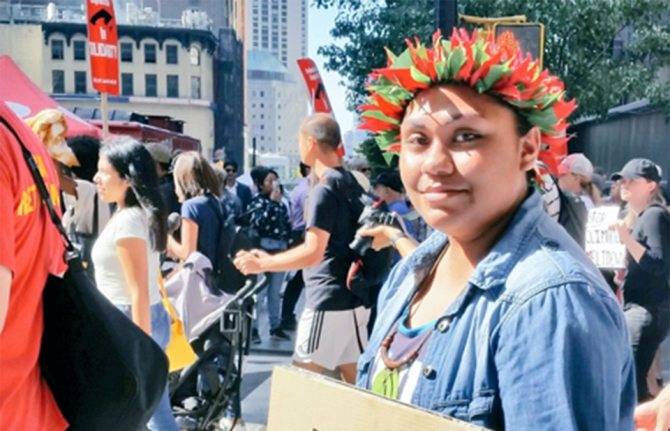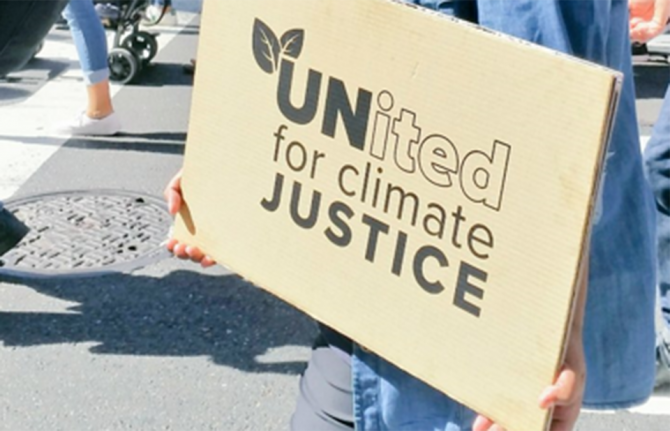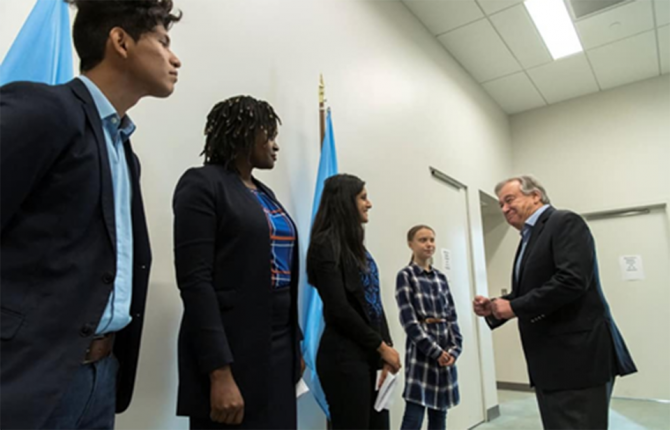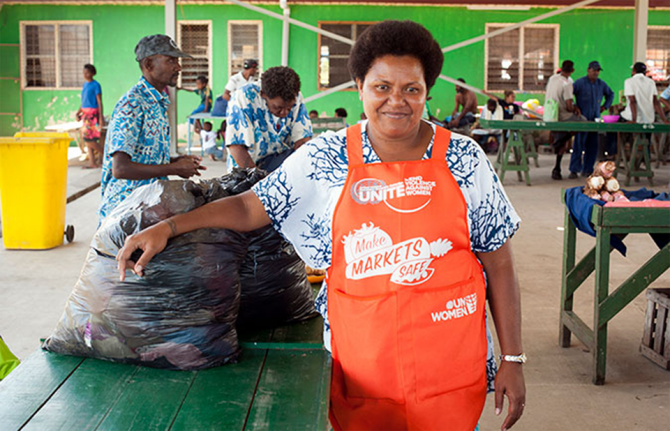




Feature Story
Raising the voices of women at the forefront of climate change
05 March 2020
05 March 2020 05 March 2020The Pacific region has among the world’s highest rates of gender-based violence. National research show that 72% of Fijian women experience gender-based violence, compared to the global average of 35%. Women in the region also have a low representation in leadership positions—out of the 560 Pacific members of parliament, 48 are women, of whom 10 are Fijian women.
Adding to these sociocultural impacts is the climate emergency. In response, Pacific women are demanding more involvement in climate-related decision-making and to be fully engaged in climate responses.
Komal Narayan, a Fijian climate justice activist, became fascinated during her postgraduate programme in development studies about how climate change overlapped with ethics and politics. “The effects of climate change are felt most acutely by the people who are least responsible for causing the problem,” she said. This motivated her to be more active and vocal about the issue, leading to her participation, together with other young delegates from Fiji, in the twenty-third United Nations Climate Change Conference, held in Bonn, Germany, in 2017.
“My goal in life is to be part of a society that is focused on addressing the issues of climate justice and encouraging and motivating more young people to be more involved in this space, as I believe that this issue is not just yours or mine but an issue that is at heart for the entire Pacific,” Ms Narayan said.
Ms Narayan was also one of the Green Ticket Recipients for the United Nations Youth Climate Action Summit in September 2019, where she was involved in a youth-led dialogue with the United Nations Secretary-General.
“As givers of life, as dedicated mothers, thoughtful sisters, domestic influencers and active contributors to socioeconomic development, we women have the power to give impetus to the global climate movement,” Ms Narayan said. “It’s about time that women and girls are given equal opportunities and equal access to resources and technology to be able to address climate justice. Countries, specifically government and civil society, should be playing a key role in this.”
AnnMary Raduva, a year 11 student at Saint Joseph’s Secondary School in Suva, Fiji, believes that climate justice must recognize the connection between humans and the environment and how vulnerable we are if we don’t do something today.
“In the Pacific region, our indigenous communities depend intimately on the ecological richness for subsistence, as well as economically, and this dependence makes our people sensitive to the effects of extreme weather events, and we cannot ignore them. We have a close relationship with our surroundings and are deeply spiritual and culturally connected to the environment, and ocean, and this relationship has positioned us to anticipate, prepare for and respond to the impacts of climate change,” Ms Raduva said.
In 2018 she wrote to the Fijian Prime Minister asking him to relook at the Fiji Litter Act 2008 to classify balloon releasing as littering in Fiji. Ms Raduva soon realized that talking about balloon releasing was not enough, however, and that she had to find eco-friendly alternatives to amplify her message. The idea of planting mangroves along the Suva foreshore soon came to her.
Since 2018, she has initiated six planting activities and has planted more than 18 000 mangrove seedlings. She was invited to New York, United States of America, in September 2019 to march for climate justice at a United for Climate Justice event organized by the Foundation for European Progressive Studies. She stood in solidarity with the indigenous communities that are on the forefront of climate change as it advances in the Pacific region.
Ms Raduva has faced discrimination as a young female activist and has been mocked as a “young, naive girl”. She was told that she must not talk about climate change because activism is reserved for boys and adults. However, she believes that ensuring the participation of women, children and lesbian, gay, bisexual, transgender and intersex people and other minority groups in climate change talks is a priority for any institution or organization that aims to champion climate change issues.
Varanisese Maisamoa is a survivor of Cyclone Winston, which in 2016 was one of Fiji’s most powerful natural disasters. In 2017, she formed the Rakiraki Market Vendors Association, working with UN Women’s Markets for Change project—“We want to empower our market vendors to be climate-resilient,” she said. Through UN Women’s leadership training, she learned to be confident when speaking out about the issues affecting market vendors and to negotiate with the market council management.
Ms Maisamoa represented her association on the design of the reconstruction of Rakiraki’s market, which now features infrastructure resilient to a category 5 cyclone, a rainwater harvesting system, flood-resistant drainage and a gender-responsive design.
Ms Narayan, Ms Raduva and Ms Maisamoa are among the Pacific women who are pushing for more of a voice in and inclusiveness for women and girls in climate action. Their activism is working to reduce discrimination against women and girls, which results in inequalities that make them more likely to be exposed to disaster-induced risks and losses to their livelihood, and to build resilience for women to adapt to changes in the climate.
Ms Maisamoa’s story has been republished with permission from UN Women’s Markets for Change project, which is a multicountry initiative towards safe, inclusive and non-discriminatory marketplaces in rural and urban areas of Fiji, Solomon Islands and Vanuatu that promotes gender equality and women’s economic empowerment. Implemented by UN Women, Markets for Change is principally funded by the Government of Australia, and since 2018 the project partnership has expanded to include funding support from the Government of Canada. The United Nations Development Programme is a project partner.



